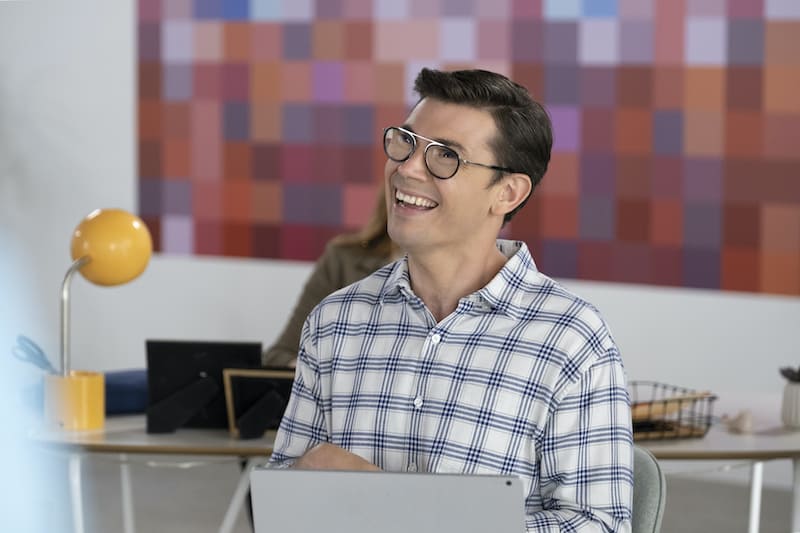Welcome to Previously On, a column that gives you the rundown on the latest TV. This week, Valerie Ettenhofer reviews Season 2 of Ryan O’Connell’s comedy series Special.
This weekend, Netflix drops the second and final season of one of its best original programs, which is also one of modern television’s most casually revolutionary series: Special, the comedy-drama created by and starring Ryan O’Connell based on his memoir about life as a gay Millennial with a physical disability. With episodes running just twelve to seventeen minutes in length, the show’s first season was short and mostly sweet, but its second is a sharp and singular romantic comedy that bows out on a high note.
Special offers a frank and specific take on disability, one that subverts able-bodied folks’ tired attempts to find inspiration in the stories of those who are perceived as different. Ryan Hayes (O’Connell) is a unique character all around: a gay twenty-something writer with mild cerebral palsy who at the beginning of the series still lives with his codependent mother, Karen (Jessica Hecht). He’s selfish and complicated — he lies about the origin of his limp while at work in one episode, and he loses his virginity in an affirming, vulnerable interaction with a sex worker in another.
Season 2 of Special finds its rhythm with eight full-length episodes. And at its candidly clever high points, it shows shades of Sex and the City and other addictive small-screen rom-coms. Ryan, now living alone and estranged from his mother, is drawn to both newly polyamorous Tanner (Max Jenkins) and vibrant, autistic Henry (Buck Andrews). Meanwhile, his best friend, Kim (Punam Patel), hits it off with both a tech genius who seems too good to be true (Charlie Barnett) and a beloved childhood friend (Utkarsh Ambudkar).
The series’ first season, which was written entirely by O’Connell, was entertaining but comedically uneven, veering between toothless one-liners and offensive jabs, the latter delivered almost entirely by Ryan and Kim’s vaguely sociopathic boss, Olivia (Marla Mindelle). Scenes set at the soulless clickbait website Eggwoke still feel out of place — stranger, meaner, and less realistic than the rest of the show. But Special‘s comedy has evened out in Season 2, thanks in part to an expanded writer’s room.
In one scene from the new season, a birthday party hilariously culminates in a solemn karaoke rendition of Lil Kim’s “How Many Licks.” In another, Ryan’s coworker says she finally “gets” him because she binge-watched the Netflix series Atypical. Special is a gentle-hearted series that dips into drama as often as comedy, but it also contains unexpected wells of weird humor that keep it entertaining no matter the circumstance.
The show might be driven by romance and comedy, but its thematic focus still lies on identity: Ryan must navigate the dating world with his disability in mind and find the people who make him feel most comfortable in his body. He’s grown since last season, but he’s still refreshingly flawed, and his experiences are an anti-inspiration porn antidote to the countless broad stories being told about disability on screen.
There’s no big transformative arc about overcoming ableism to be found here, nor any grand moment in which Ryan achieves something he thought impossible — except for maybe sweeping the floor. Ryan is simply living his life, and his cerebral palsy is a part of it. The show openly discusses tokenism, especially when it comes to plus-sized Indian-American woman Kim. By discussing the problem of tokenism and then elegantly answering it with the inclusion of complex, multi-dimensional characters, Special takes vital strides in authentic on-screen representation.
Though it tacks a passable full-circle ending onto its final episode, Season 2 of Special also opens up its narrative world in a way that feels like anything but a conclusion. Karen has always been an interesting character, a life-long obsessive caretaker who is finally working on loosening up. Kim is also a character I’d love to see more of; her projected confidence is offset by a sense of financial insecurity, and she’s sometimes at odds with her more traditional parents. Kim and Karen both feel like real people, the kind of characters who are capable of invigorating a TV landscape that’s still often riddled with cookie-cutter archetypes.
Cut down in its prime, Special joins the graveyard of canceled Netflix series, unfinished and in suspended animation, that clearly had several more seasons’ worth of creativity in the tank. The streaming company may have chosen to end Special, but O’Connell told The Hollywood Reporter he’s “not finished telling stories about disability” and queer characters. Hopefully, that’s a promise.

